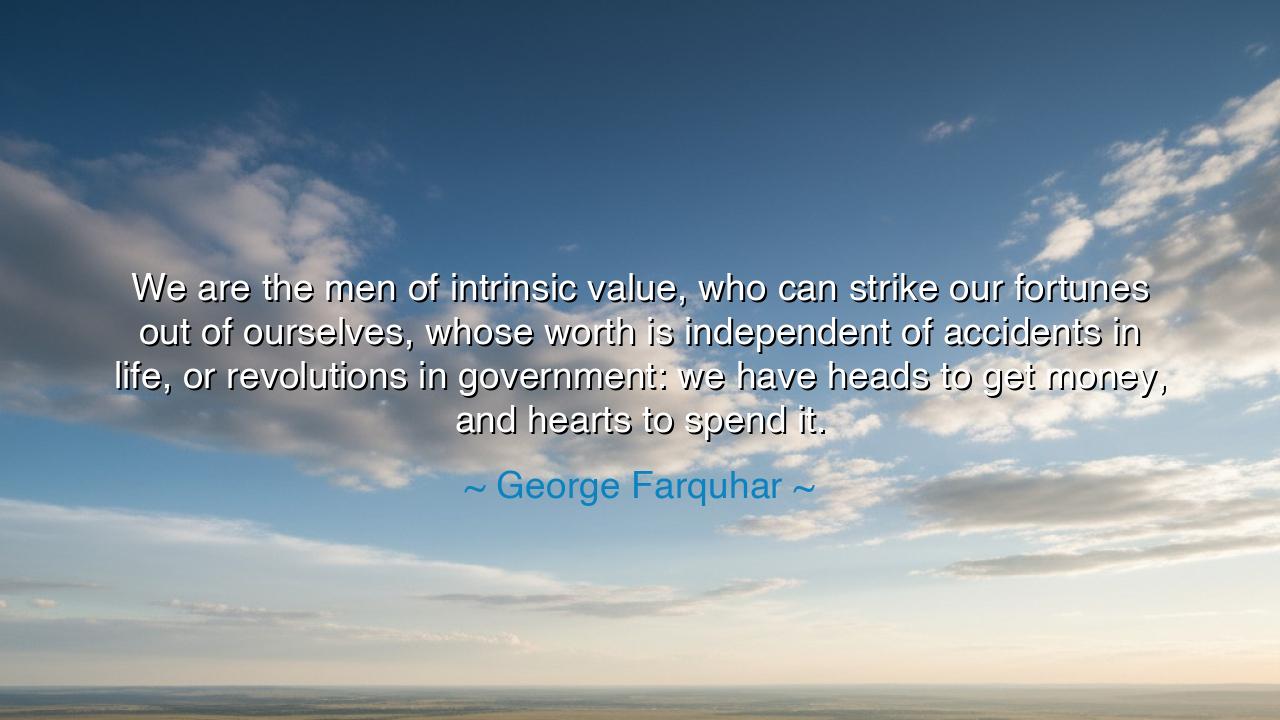
We are the men of intrinsic value, who can strike our fortunes
We are the men of intrinsic value, who can strike our fortunes out of ourselves, whose worth is independent of accidents in life, or revolutions in government: we have heads to get money, and hearts to spend it.






In the days when wit was the jewel of the mind and honor the coin of men, George Farquhar, the Irish playwright of the seventeenth century, spoke words that still shine like gold untouched by rust: “We are the men of intrinsic value, who can strike our fortunes out of ourselves, whose worth is independent of accidents in life, or revolutions in government: we have heads to get money, and hearts to spend it.” These words, born in an age of social upheaval and shifting powers, were not the idle boasting of a fool, but the proud declaration of a soul that had learned the true source of human worth — that it lies not in circumstance, nor in favor, but in the intrinsic power of one’s own spirit.
In Farquhar’s time, men lived amidst uncertainty. Thrones toppled, wars erupted, fortunes rose and fell like the tides of the sea. Yet even then, he saw that the man who relies on fortune, who ties his worth to crowns or coins or titles, is like a leaf in the storm — tossed wherever the wind commands. But the man of intrinsic value — ah, he is of another breed. He is the man whose riches dwell within his mind, whose courage is his capital, whose wisdom and will are his inheritance. Such a man, when cast into poverty, builds again. When nations crumble, he remains unshaken, for his foundation lies within himself.
Consider the story of Benjamin Franklin, that humble printer who rose from the streets of Boston to become a statesman of nations. He began with nothing — no wealth, no name, no noble lineage. Yet he possessed that rare treasure of which Farquhar spoke: the power to “strike his fortune out of himself.” By his ingenuity, his labor, and his curiosity, he carved greatness from the clay of obscurity. When others despaired at misfortune, Franklin turned it into opportunity. He proved that worth is independent of accidents in life, that the man who governs himself can withstand even the revolutions of the world.
Farquhar also spoke of the heart to spend it — and this is a wisdom often forgotten by those who chase gain without end. What use is gold if it hardens the soul? What glory is success if it turns one’s heart to stone? The true man of worth is not only able to make, but also to give — to spend his fortune in generosity, to invest his labor in others, to find joy in sharing the fruits of his toil. For as the ancients taught, the miser dies a pauper, but the generous man lives a king.
In this balance between the head and the heart, between the power to create and the grace to give, lies the essence of Farquhar’s wisdom. The world honors the clever, but often forgets the compassionate. Yet greatness demands both: the intellect to build and the spirit to bless. To possess one without the other is to live half a life. The man of intrinsic value stands complete — wise in enterprise, yet noble in charity.
Even in our age, when fortunes are made with numbers and lost in seconds, Farquhar’s truth endures. The storms of economy, the revolutions of technology, the shifting towers of power — these are but new versions of the same ancient wheel. But the soul that knows its own worth does not tremble. The man or woman who has built themselves — in skill, in discipline, in moral strength — can never truly be poor, for they carry their wealth within.
So take this teaching, you who seek meaning in a fickle world: build your worth not upon chance, but upon character. Let your mind be a forge, your heart a compass. When misfortune strikes, do not curse the heavens — strike your fortune anew. And when prosperity comes, do not hoard it — let it flow through your hands like a river that nourishes the earth. For the true measure of a person is not how much they have gathered, but how much they can create, endure, and share.
Thus, live as Farquhar’s men of intrinsic value — steadfast, inventive, and generous. When the winds of life shift, you will not fall. You will stand like the oak whose roots reach deep, whose branches stretch wide, whose leaves dance in every storm — not because the storm is kind, but because your strength is your own.






AAdministratorAdministrator
Welcome, honored guests. Please leave a comment, we will respond soon